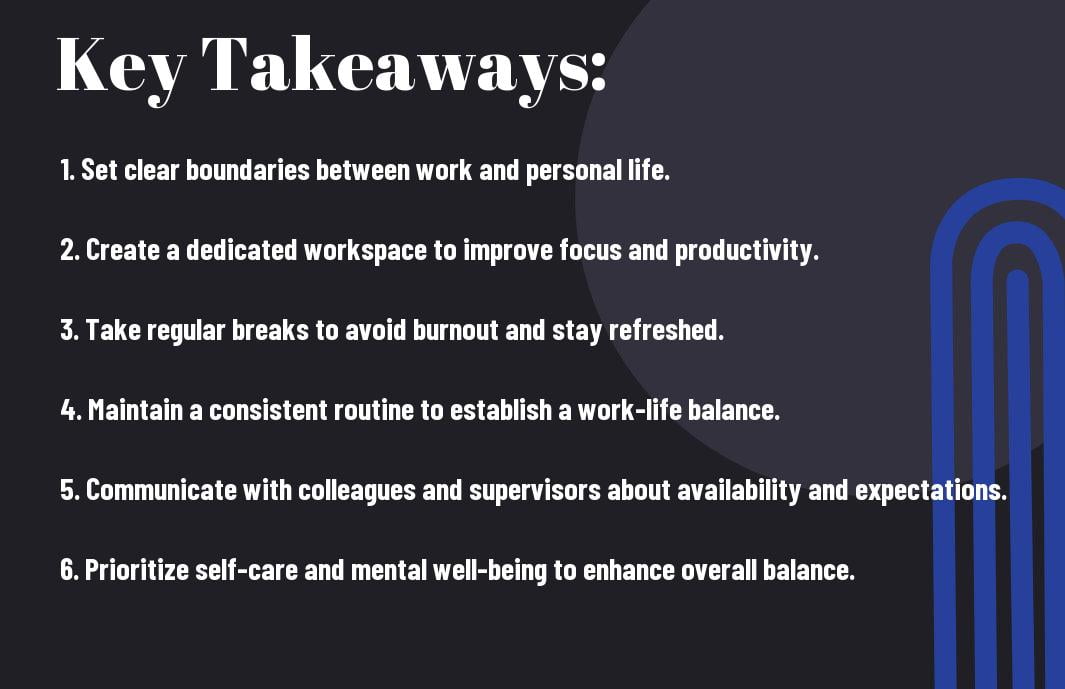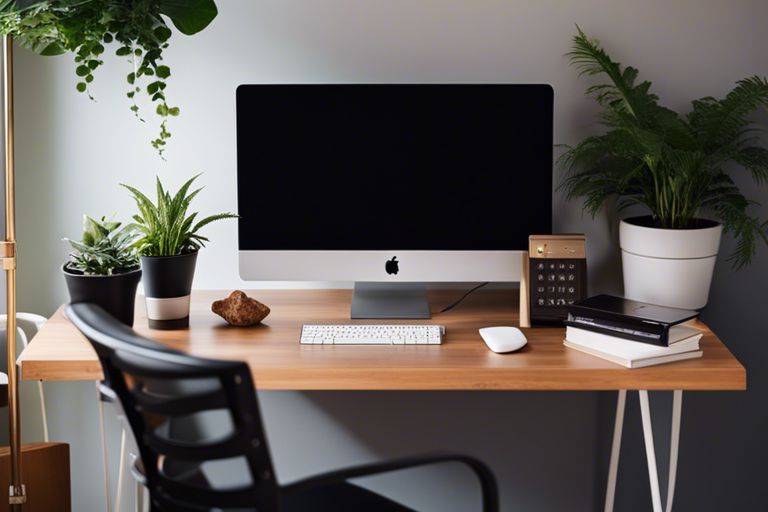Productivity can be a challenge when working from home, blurring the lines between work and personal life. Striking a healthy balance is crucial for overall well-being and mental health. Setting boundaries, creating a designated workspace, and establishing a routine are vital for efficiency and mental clarity. Ignoring the importance of separating work life from home life can lead to burnout and decreased productivity.

Key Takeaways:
- Set boundaries: Establish specific work hours and break times to maintain a healthy balance between work and personal life.
- Create a dedicated workspace: Designate a separate area in your home for work to help focus and separate work from personal activities.
- Take regular breaks: Remember to step away from your work area, stretch, and take short breaks to refresh your mind and avoid burnout.
Understanding the Challenges of Working from Home
Blurred Boundaries between Work and Personal Life
A common challenge of working from home is the blurred boundaries between work and personal life. It can be difficult to establish clear separation between work hours and personal time when they occur in the same space.
Increased Risk of Burnout and Exhaustion
On top of blurred boundaries, remote work can lead to increased risk of burnout and exhaustion. The lack of physical separation between work and home environments can cause individuals to work longer hours without proper breaks.
Another challenge faced by remote workers is the difficulty in separating work and personal responsibilities. When work duties and personal tasks coexist in the same environment, it can be challenging to prioritize and allocate time effectively.
Responsibilities can easily overlap, causing stress and potential neglect in either area. Implementing clear boundaries and a structured routine can help mitigate this challenge.

Setting Up a Productive Home Workspace
The 9 ways to improve work-life balance while working from home can be structured around setting up a productive home workspace. This is crucial for maintaining a healthy work-life balance.
Creating a Dedicated Workspace
One of the first steps to improve your work-from-home productivity is to create a dedicated workspace. Find a quiet corner or room in your home where you can set up your office vitals.
Minimizing Distractions and Interruptions
Home distractions can significantly affect your productivity. Consider setting boundaries with family members and establishing a clear work schedule to minimize interruptions during your working hours.
Dedicated workspace: Ensure your workspace is organized and free from clutter. Designate specific work hours where you can focus without interruptions. Implement strategies like noise-canceling headphones or a do-not-disturb sign to signal when you are concentrating.
Investing in Essential Equipment and Tools
Setting up your home office with vital equipment and tools will enhance your productivity. Invest in a comfortable chair, a suitable desk, proper lighting, and any technology needed to perform your job efficiently.
The key to a productive home workspace is having the right tools at your disposal. Consider investing in ergonomic furniture to support your posture, high-speed internet for seamless connectivity, and noise-cancelling headphones for added focus. These vitals can optimize your work environment and overall performance.
Establishing a Routine and Schedule
Once again, one of the keys to maintaining a healthy work-life balance while working from home is by establishing a routine and schedule. Without the structure of a traditional office setting, it’s crucial to create a schedule that works for you and helps you separate work from personal time.
Creating a Daily Schedule and Sticking to It
On a daily basis, outline a schedule that includes set work hours, breaks, and personal activities. Be disciplined in following this routine to ensure productivity and a clear distinction between work and leisure time.
Prioritizing Tasks and Managing Time Effectively
Effectively managing your tasks and time is imperative for a successful work-life balance. Prioritize your tasks based on urgency and importance to avoid feeling overwhelmed and ensure that important deadlines are met.
Tasks: When tackling your tasks, consider using time management techniques such as the Pomodoro technique to focus on work for set periods with short breaks in between.
Taking Regular Breaks and Practicing Self-Care
Tasks: It’s important to take regular breaks throughout your workday to prevent burnout and maintain optimal productivity levels. Use break times to practice self-care activities such as stretching, meditating, or going for a short walk to refresh your mind and body.
It is imperative to prioritize your well-being by incorporating self-care practices into your daily routine to avoid stress and maintain a healthy work-life balance.
Managing Family and Personal Responsibilities
Communicating with Family Members and Setting Boundaries
To ensure a successful work-life balance while working from home, it’s crucial to communicate openly with family members about your work schedule and the boundaries that need to be respected. Setting clear expectations can help minimize interruptions and allow for focused work time.
Managing Childcare and Elderly Care Responsibilities
Setting aside dedicated time for childcare and elder care is imperative when working from home. Establishing a routine and seeking support from other family members or professional caregivers can help manage these responsibilities effectively.
Managing Childcare and Elderly Care Responsibilities: It may be helpful to create a schedule that includes designated work hours and specific times for caregiving tasks. Prioritizing tasks and delegating responsibilities can also alleviate some of the pressures of balancing work and caregiving.
Maintaining Social Connections and Relationships
On top of work and family responsibilities, it’s important to make time for maintaining social connections and relationships outside of the home. Schedule virtual coffee breaks or evening calls with friends and loved ones to stay connected and reduce feelings of isolation.
Responsibilities: While juggling work and family commitments, don’t overlook the importance of nurturing relationships outside of your immediate circle. Making time for social interactions can boost your well-being and prevent feelings of loneliness.
Staying Motivated and Avoiding Isolation
Now that you are working from home, it can be easy to feel isolated and unmotivated. However, there are strategies you can use to stay connected and engaged.
Staying Connected with Colleagues and Friends
For staying connected with colleagues and friends, make an effort to schedule regular virtual meetings or coffee breaks. Utilize technology like video calls or group chats to maintain communication and camaraderie.
Joining Online Communities and Networking Groups
Groups joining online communities and networking can provide a support system and opportunities for collaboration. Look for industry-specific groups or general networking platforms to connect with like-minded professionals.
To enhance your networking efforts, actively participate in discussions, share insights, and seek advice from others in the online community. These interactions can lead to valuable connections and potential career opportunities.
Celebrating Achievements and Milestones
The key to maintaining motivation while working from home is to celebrate achievements and milestones, no matter how small. By recognizing your progress and successes, you can stay motivated and focused on your goals.
Celebrating your achievements also boosts your morale and self-confidence, which is crucial for productivity and overall well-being. Consider treating yourself to something special or sharing your wins with colleagues and friends to mark these significant moments.
Maintaining a Healthy Work-Life Balance
Prioritizing Self-Care and Wellness
After a long day of working from home, it’s crucial to prioritize self-care and wellness. Make time for activities that help you relax and recharge, such as meditation, reading, or taking a soothing bath. By incorporating self-care practices into your routine, you can prevent burnout and maintain a healthy work-life balance.
Engaging in Regular Exercise and Physical Activity
Exercise is vital for both physical and mental well-being. Regular physical activity can help reduce stress, improve concentration, and boost your mood. Even a short workout or a brisk walk can make a significant difference in how you feel throughout the day.
Setting Realistic Goals and Expectations
WorkLife balance is all about setting boundaries and managing expectations. Be realistic about what you can accomplish in a day and avoid overcommitting yourself. Prioritize tasks, delegate when possible, and don’t hesitate to ask for help when needed. By setting achievable goals and expectations, you can avoid feeling overwhelmed and maintain a healthy balance between work and personal life.
Conclusion
Ultimately, achieving work-life balance while working from home is crucial for maintaining productivity and well-being. By setting boundaries, establishing a routine, and prioritizing self-care, individuals can create a harmonious environment that supports both their professional and personal lives. It is important to remember that balance looks different for everyone, so finding what works best for you is key to success in remote work.
FAQ
Q: What is work-life balance and why is it important while working from home?
A: Work-life balance refers to the equilibrium between work responsibilities and personal life activities. It is crucial while working from home to avoid burnout, maintain productivity, and preserve overall well-being.
Q: How can I establish a healthy work-life balance when working remotely?
A: To maintain a healthy work-life balance while working from home, set clear boundaries between work hours and personal time, create a designated workspace, take regular breaks, prioritize tasks, and communicate effectively with colleagues and family members.
Q: What are some tips to improve work-life balance and well-being while working remotely?
A: Prioritize self-care activities such as exercise, proper nutrition, adequate sleep, and mental health practices. Establish a routine, practice time management, engage in hobbies, and seek social connections outside of work to enhance work-life balance and overall well-being while working from home.


